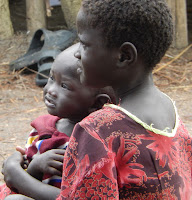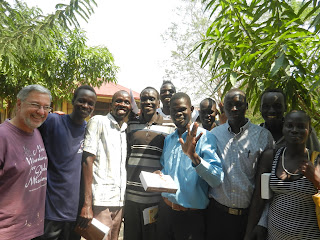“Bishop, should we cancel Christmas celebrations?” This rather strange sounding question was addressed to Archbishop...
SAMS-USA Ministry In
Ethiopia
Interested in Ministry to Ethiopia?
SAMS-USA missionaries partner with Anglican/Episcopal churches in this region to grow the Kingdom of God. We hope you will be encouraged or inspired by these stories and reports from current and former missionaries in the field. We also encourage you to consider becoming a sender to this part of the world.
Prayer Letter, April 2016
It is strange how one forgets the calamitous, cacophonic chaos of security and check-in lines at Ethiopian...
Q&A Johann Vanderbijl Dean of St Frumentius’ Anglican Theological College
There is an urgent need for theological training in the region of Gambella, in the west of Ethiopia. There are over 90...
Newsletter – February 2016
I was trying to explain the difference between ‘simple’ and ‘complex’ to my English students the other day. “Simple,”...
War…and Rumours of…
Bishop Grant and Doctor Wendy 2016-02-10 01:24:00
War…and Rumours of War
 |
Jesus, the Prince of Peace |
“The tongue is a small thing, yet, …how great a forest is set ablaze by such a small fire!” (James 3:5)
(Ps 112: 1,7) “Blessed is the man who fears the Lord…he is not afraid of bad news; his heart is firm, trusting in the Lord.”
+ Grant
 |
Pray for the children |
~ Please Pray with us ~
 |
| St Frumentius students with Grant and faculty member Jeremiah Maet, taken the day before the trouble began. |
~ Pray for our wisdom and discernment regarding the safety and well-being of our staff and faculty.
 |
“Mosquito” used in our Mothers’ Union teaching on Malaria, during the dramatic presentation of “Helping Each Other when Little Things cause Big Problems” |
Newsletter, January 2016
After the dismantling of the apartheid system in South Africa, many previously segregated Bible Colleges and...
Newsletter, December 2015
I have been meditating on a prayer in a book of Puritan Prayers and Devotions, [1]and thought I might use it as a...
We Remember…Beloved Ojullu…
Bishop Grant and Doctor Wendy 2015-11-30 03:47:00
We Remember…
Beloved Ojullu Obilla, died Oct 26, 2015, age 39 yrs. We join with his family and friends in grief and in hope. Ojullu had provided for this dear young woman since the death of her own family. “Who will care for me now?”, she sobbed.
Ojullu was to have been ordained deacon this week at the dedication of St Frumentius Anglican Theological College by Archbishop Mouneer Anis.
Remembrance 2015: World War III?
And We Rejoice…
~ With Jeremiah Maet Paul and his wife Elizabeth on the birth of their son, Kahn, November 14, 2015 Jeremiah is professor of African Traditional Religion at the St Frumentius Anglican Theological College.
~ At the upcoming visit of Archbishop Mouneer Anisfor the dedication of St Frumentius Anglican Theological College to be held November 24, 2015
~
| Mothers’ Union celebrate the dedication of Holy Bible Anglican Church at Jewi Refugee Camp, Oct 25,2015 |
 |
| A little member of Holy Bible Anglican Church, Jewi Refugee Camp |
~ for Peace between Nuer and Anuak in the Akobo region of South Sudan
~ For Grant and Wendy as they approach a particularly busy period of travel and teaching
~ For the victims of terror in Paris, Beirut, Mali, Somalia, Nigeria and elsewhere throughout the world

